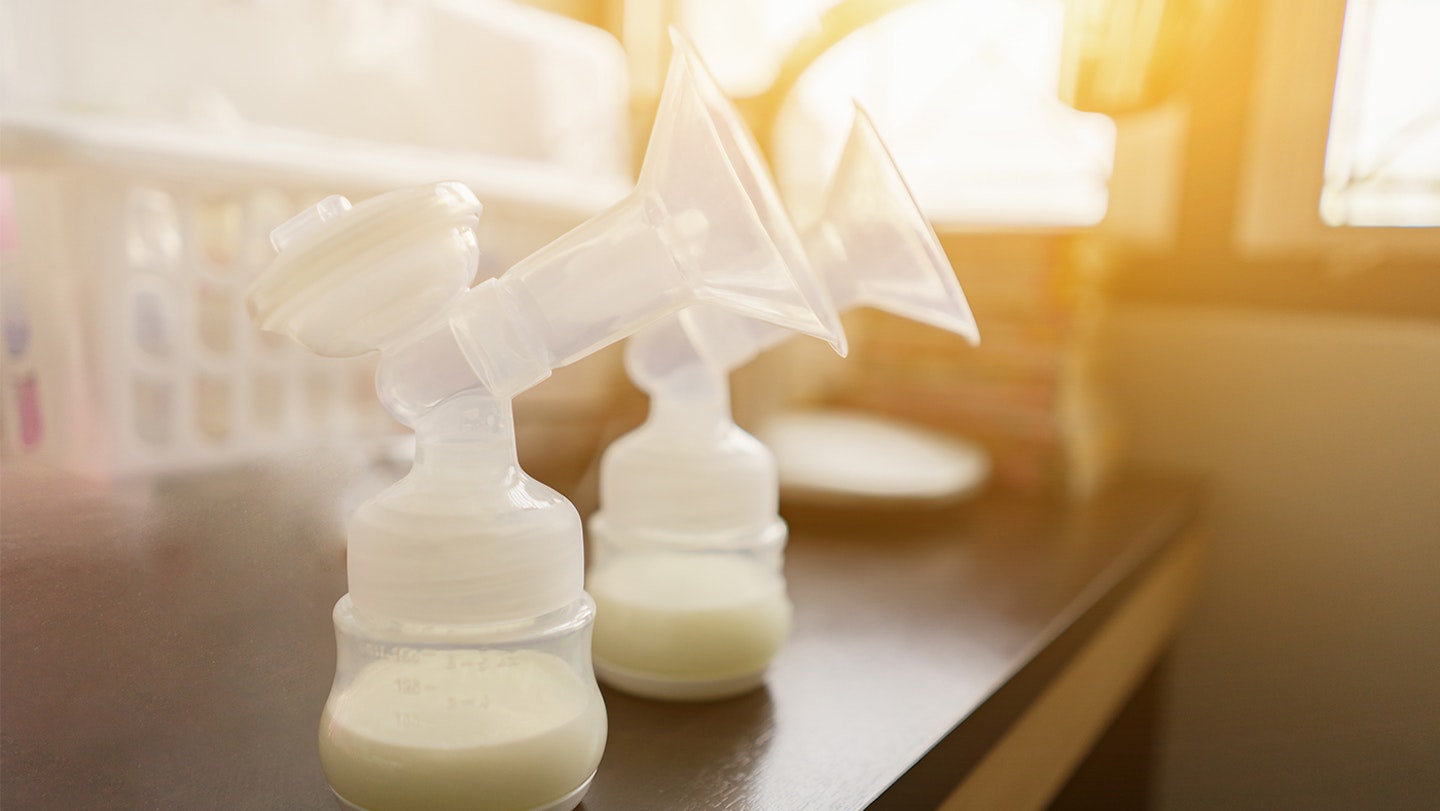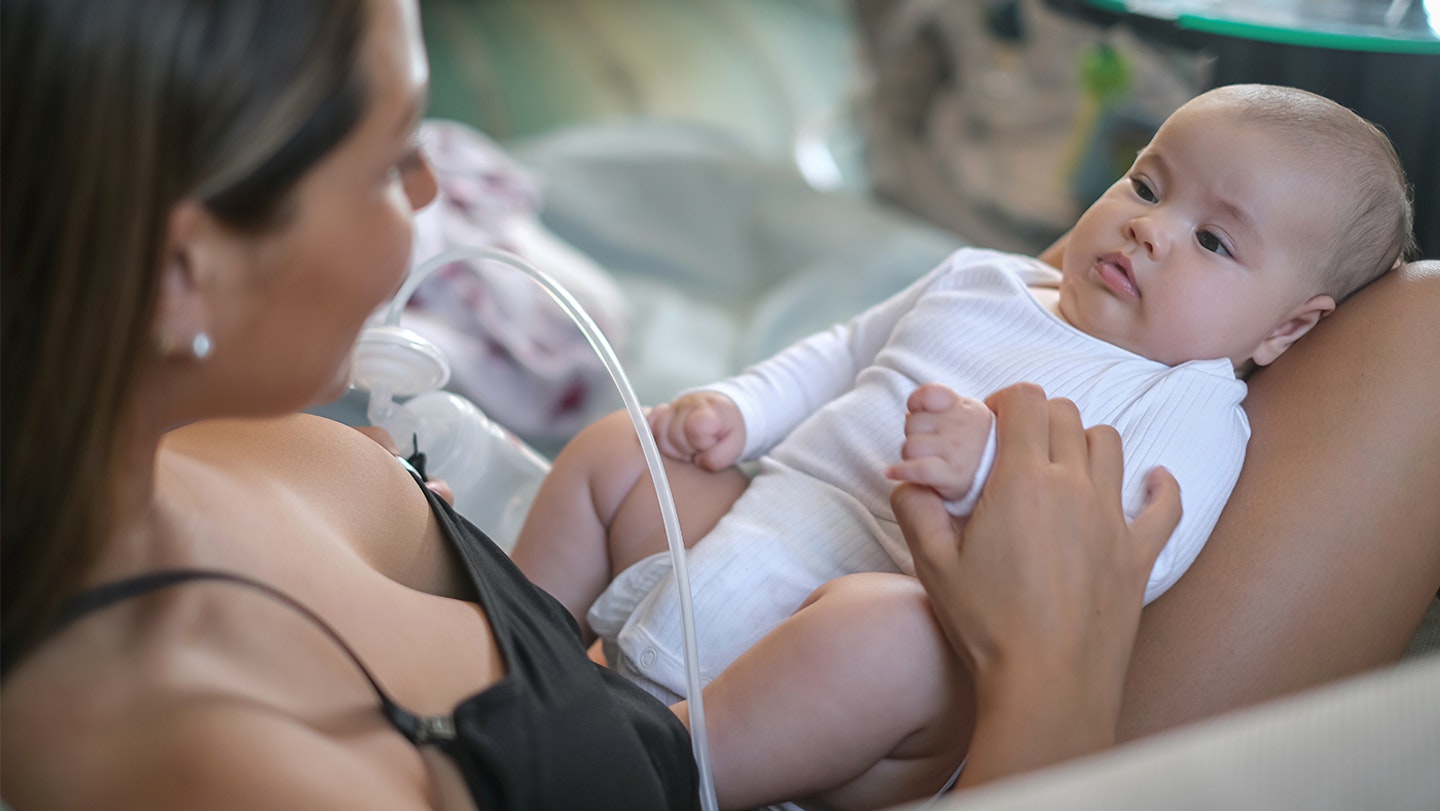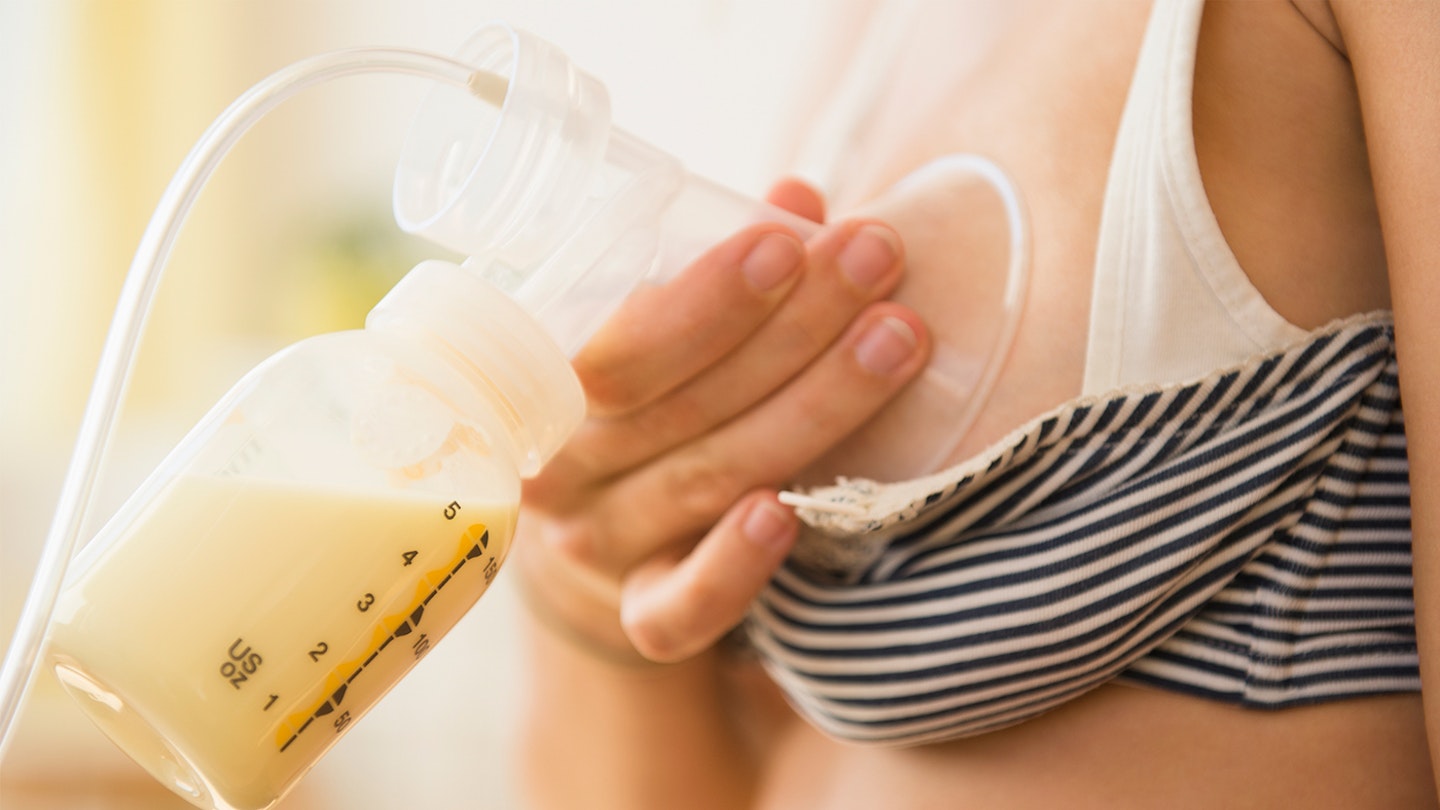There's a lot to get to grips with when it comes to feeding your baby, not to mention the plethora of products you potentially might need from finding the best breast pump to baby bottles. Whether you've struggled with breastfeeding or want your partner to be more involved in feeding, exclusive pumping could be the way forward for you.
If you've heard the phrase exclusive pumping and wondered if it could be for you, Jo Parkington, resident Midwife for Fraupow, explains more. Having worked on the frontline of midwifery within the NHS in the UK and in the private sector, and being the founder and CEO of a number of organisations, including One to One Midwives which was the first midwifery led organisation to be commissioned by the NHS, Jo wants to ensure that all expectant parents, from anywhere in the world, can access safe and effective midwifery and advice.
What is exclusive pumping?
When a mother wants to feed her baby only on breastmilk but does not want to or is unable to put the baby directly to the breast, she will have to express the breastmilk either by hand or using a pump. This is known as exclusive pumping. The breastmilk can then be fed to baby via a bottle and how often you pump breast milk depends on your baby's age and your lifestyle.
Why exclusively pump?
There are many reasons why women choose to exclusively pump and often the decision is made before baby is even born. Some women are worried about breastfeeding, especially in public, but they still want the baby to get all the benefits of their breastmilk.
The choice might be based on medical reasons (although this is very rare) for example if your baby was born prematurely and is unable to be breastfed while in NICU, but also to store up a stock of milk for use at a later date, because they have to be away from their baby or simply because it suits them.
You might also decide to exclusively pump if you're having trouble breastfeeding or getting your baby to latch properly.
Is exclusively pumping harder than breastfeeding?
Successful pumping is more about your mind as well as your body – you produce milk using the hormone Prolactin but your body releases the milk using the hormone Oxytocin. This is known as the ‘love’ hormone and is only released when you feel relaxed and safe. We also call this process the ‘let-down reflex’ – you can have boobs full of milk but if you do not release oxytocin you will not be able to effectively pump.
It can be harder to release milk when you pump compared to breastfeeding. Baby is definitely the most efficient at initiating the let-down reflex and you need a good let-down to get a good supply of milk. Pumping whilst holding baby or having baby near you is really beneficial to support the let-down reflex.
Some women say they feel just like a ‘milk machine’ when they have to pump so often and it can take away the pleasure of feeding your baby, plus can take time away that you could be spending with baby.
Using a wireless, hands-free breast pump will enable you to carry on with other things while you pump. A wireless electric breast pump will sit inside your bra so you can still walk around, look after your baby or do whatever you need to do rather than sitting in one spot the whole time.
Can I exclusively pump as soon as my baby is born?
You can only exclusively pump after your baby is born. This is because you do not produce breastmilk until after the birth of the placenta (before this time you produce colostrum, a superfood loaded with benefits to your baby). As soon as baby is born, you can begin to pump but it is important to set expectations on how effective exclusive pumping will be if you have not established breastfeeding first.

How often should I exclusively pump?
It can be tricky working out the best time to pump breast milk. When you breastfeed your baby, your milk supply is based on supply and demand. This simply means that you will produce the milk that baby needs, when baby needs it. Your milk production increases at night due to the hormone Prolactin, so baby will instinctively feed more at night as they know there is more milk!
If you have not established breastfeeding first, you will need to have a set routine for exclusive pumping so that your body responds to the ‘supply and demand’ – in other words, you have to trick your body into thinking you need to produce milk as if your baby was feeding from the breast.
Exclusive pumping schedule
A breastfed baby will feed frequently throughout the day and night so if you exclusively pump before establishing feeding you will need to pump at least 8-10 times a day for a minimum of 30 mins for each breast pumping session – and from both breasts.
If possible, you should try to pump more towards the end of the day and first thing in the morning to take advantage of the Prolactin production.
As a rough guide you can follow the below schedule:
Up to 2 months: 8+ pumps per day, two night pumps
6am, 9am, 12pm, 3pm, 6pm, 9pm, 12pm, 3am
3-4 months old: 6-7 pumps per day, one night pump
6am, 10am, 2pm, 6pm, 10pm, 2am
5-6 months old: 5-6 pumps per day, no night pump
6am, 10am, 2am, 6am, 10pm
6 months old - weaning: 4 pumps per day, (morning, lunch, afternoon, night)
6am, 11am, 4pm, 10pm
Weaning:
3 pumps per day, 6am, 2pm, 10pm
2 pumps per day, 6am, 10pm
1 pump per day, 6am
How much milk should I be producing?
When you start expressing milk, it can be tricky to get it flowing. Boobs are not taps - you can’t just switch the flow on and fill up a bottle.
In the early days of expressing it is quite normal to only get a few ml at a time, and as your baby gets older you will naturally find that milk volume increases as your supply adjusts to match your baby’s increased hunger – this is known as supply and demand.
The real key is the let-down reflex, if you're not producing Oxytocin it will be harder to release milk. Many women confuse this with the fact that they do not believe they are producing enough milk when in fact it is not the production that is the issue but how you are feeling!
At certain times you may need to give power pumping a go – this replicates cluster feeding, a process babies would naturally initiate at times of a growth spurt. Power pumping can increase milk supply so if there is a lack of milk being produced, this can help encourage your body to produce more milk.

How can I produce more milk?
First and foremost you produce milk from what YOU eat and drink – so you need to look after yourself! You should drink at least 2-3 litres a day and eat small frequent meals – you need to treat exclusive pumping just like you would if you were exclusively breastfeeding.
To help you release the most milk through expressing there are a few things you can try:
• Be in the same room as your baby, or at least look at a photo of them and think about them. Remember, the hormone Oxytocin, released by the bond with your baby will help your milk to flow.
• Stay hydrated, drink plenty of water throughout the day.
• Ensure you are comfortable and relaxed, preferably in a place where you feel safe.
• Ensure your pump is correctly and comfortably positioned, and try adjusting the intensity level until you find a level that is powerful but comfortable for you.
• Ensure that you have the correct sized shield on your pump, to make a good seal for optimum output.
When should I stop exclusively pumping?
You can stop pumping whenever you want to stop giving baby breastmilk. This can be for many reasons, such as going back to work or weaning baby or purely just choice.
If you have been exclusively pumping for some time it is better to ‘plan’ to stop pumping so that you can do this over a period of time. You would just need to reduce the frequency and duration of the pumping sessions every day – for example, if you are pumping 8 times a day for 30 mins you can pump 7 times a day for 25 mins, or just leave out a session every few days.
If you try to stop too suddenly your body will still produce milk for some time and your breasts may become engorged – this can be painful and uncomfortable but if you do have to stop in this way you should just avoid any breast stimulation and allow the milk to leak naturally. You will need plenty of breast pads for this method!
5 tips for exclusively expressing
After suffering from mastitis and severe nipple trauma Melissa Suffield @the.confidentmama, mum of River and one of our Mum List 2022 turned to exclusively expressing her milk and feeding with a bottle.
For the purpose of the following list, nursing covers feeding directly at the breast, pumping applies to pumped milk fed through a bottle, and breastfeeding covers both.
Set a schedule
It’s true, it’s tricky in the early days. However, with the right support, you can totally manage. Set a schedule, stick to it, track your pumps and your output - you need to treat it a bit like a job.
Nursing is not the only way to form a connection
Your child loves you no matter how you feed them. You can still make eye contact, give cuddles and stroke their little faces if they’re not at the breast.
Seek out support
The EP life can be really tough, and really lonely. I highly recommend seeking out the online community. It’s made up of mostly US based mums and they really know their stuff.
EPing is still breastfeeding
Even with all the support and education in the world, sometimes breastfeeding just doesn’t work out. Sometimes people just don’t want to. No journey is easy, every feeding method comes with its challenges, I certainly didn’t know I'd be EPing, but it was right for us.
Your milk is amazing
When my son was hot in the summer, my milk became thinner to meet his hydration needs because I was hot too. Similarly, when he was ill, my milk adapted, as if he picked up a cold somewhere, I’d been exposed to it too. With my immune system being more developed than his, I’d escape the symptoms but my body would be making the correct milk to help him fight it off. Your body is incredible, and whether your baby latches or not, it will know what your little one needs.
About the expert
Jo Parkington, resident Midwife for Fraupow - the affordable wireless breast pump, has been a midwife with the NHS and privately for over 30 years working as a midwife in all areas of maternity care.
